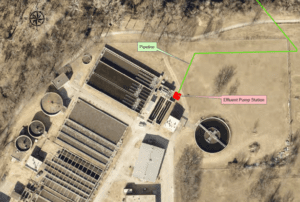The City of Bartlesville has been selected for the Oklahoma Water Resources Board’s “Water for 2060 Excellence Award” for ongoing efforts to implement the water reuse system, which will help extend water resources for the area decades into the future.
The nomination for the award was submitted by former Bartlesville mayor and city councilor Tom Gorman, who has represented Ward 3 on the City’s Water Resources Committee since its inception in 2003. Gorman also serves on the Oklahoma Water Resources Board.
The committee was formed soon after severe drought conditions at Hulah Lake made clear the community’s need for long-term water planning.
According to Water Utilities Director Terry Lauritsen, the award is in recognition of the work and planning that has been done to facilitate a water reuse system for the City of Bartlesville.
“While this project has had a lot of moving parts and has required participation from several arms of the City, including the City Council and City management, the Water Resources Committee has also been instrumental in helping to steer us in the right direction to ensure that area water needs are met in the long-term. This system will certainly help us do that,” Lauritsen said.
How it started
The water reuse project essentially began when the Oklahoma Legislature enacted the “Water for 2060” law in 2012, the goal of which is to consume no more fresh water in the year 2060 than was consumed statewide in the year 2012 while continuing to grow the population and economy of Oklahoma.
“Soon after the law was enacted, we began looking into whether or not it would be feasible for our community,” Lauritsen said. “It became clear pretty quickly that it would very likely be an excellent resource for the City of Bartlesville.”
Lauritsen said the project has been in the planning and development stages for several years, first with feasibility studies and grant application submissions and more recently with rights-of-way obtainment and infrastructure design.
“It has taken a while to get to this point, but we are moving forward with the first phase of construction on the project, which involves the renovation of the Caney River Pump Station. Additionally, the City Council on Monday approved a contract for the reuse pump station with a contract award for the reuse pipeline portion occurring this month as well.”
The contract for the work was awarded Monday to low bidder Crossland Heavy, in the amount of $1,738,000. While the amount of over the available budget of $1.5 million, additional funds are available due to sufficient savings in the pipeline portion of the project to cover the difference.
“We will recommend a contract award for the pipeline next week. Construction will likely begin in February 2022,” Lauritsen said. “We anticipate a 15-month construction time for these two components.”
 How it works
How it works
The reuse system involves the construction/installation of infrastructure that will consist of a pump station at the wastewater treatment plant and an underground pipeline transporting the water to the Caney River just south of the County Road West 1500 bridge. This will allow the City to utilize treated wastewater to augment the yield of the Caney River during periods of drought, which serves as one of the City’s main water sources.
“We will pump treated wastewater upstream of the Caney River and allow it to blend with existing river water, then send it to the water treatment plant for further treatment and, from there, to our water customers,” Lauritsen said.
What it means
For Bartlesville and the surrounding communities that rely on the City’s water resources, the water reuse project means expanding the area’s potable water supply decades into the future.
“The reuse system will extend the resources of Hulah Lake, one of the City’s primary water sources, by approximately 25 years and provide approximately 35-70 percent of current water supply needs,” Lauritsen said. “In addition, as the city continues to grow and increase in water consumption, wastewater generation and treatment will also grow and mirror water consumption. This means the project will continue to provide raw water and be a critical component of the City’s water supply system indefinitely.”
The system is expected to cost around $8.2 million, which will be funded partially through grant funding but primarily with Water Capital Investment Fees. It is anticipated the project will be online by June 2023.
For more information, see City Beat April 24, 2019.

